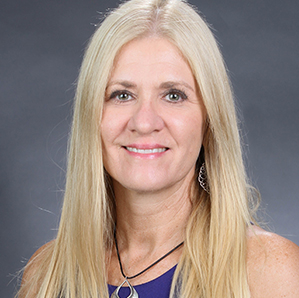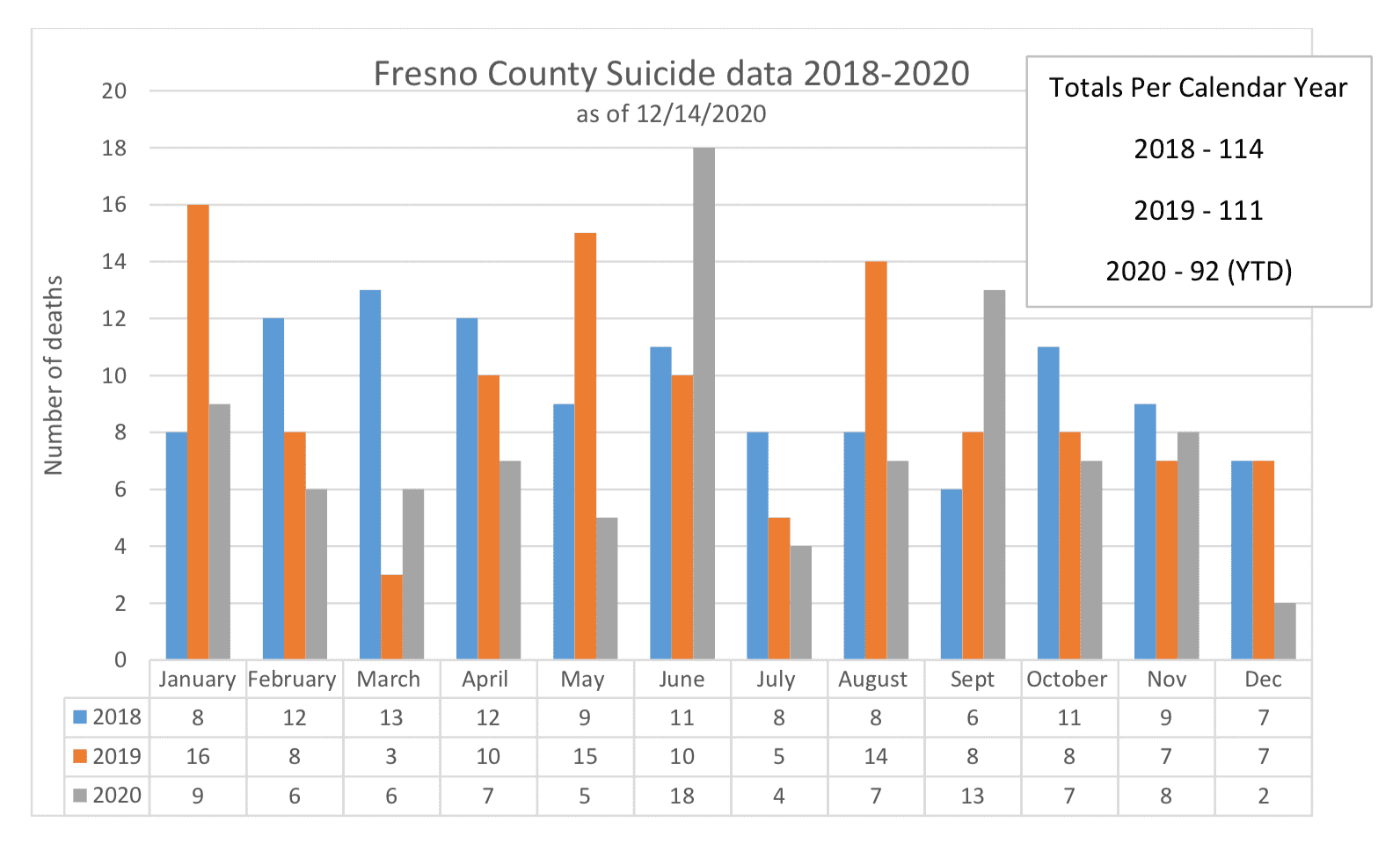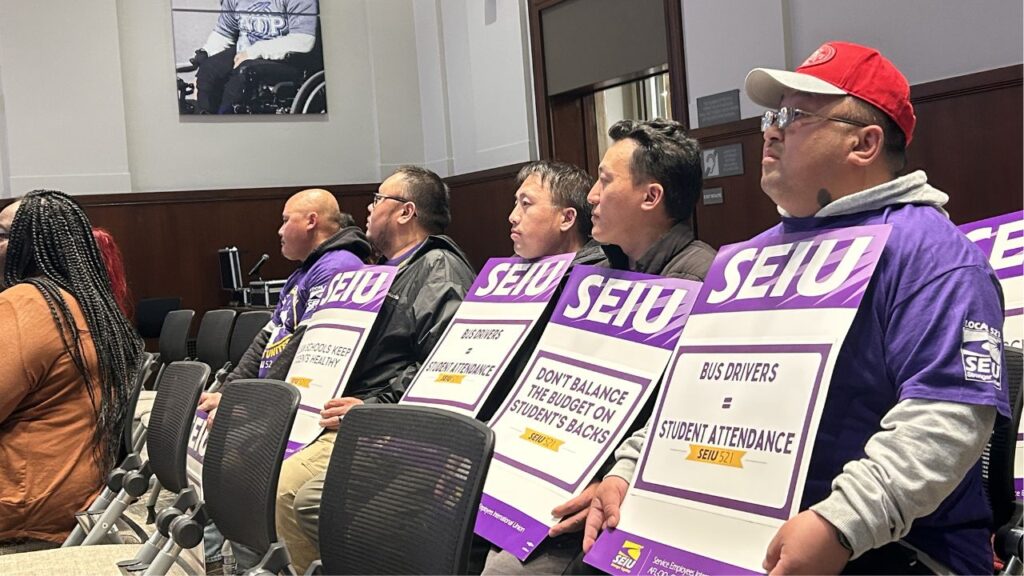Share
Fresno County officials say after a couple months with an increase in suicides during the COVID-19 pandemic, they now believe the year will end with a lower number than in the previous two years.
“At this time, we are not seeing a statistically significant difference in suicide rate for any age range compared to last year,” said Dawan Utecht, director of Fresno County’s behavioral health department.

“At this time, we are not seeing a statistically significant difference in suicide rate for any age range compared to last year.”–Dawan Utecht, Fresno County Behavioral Health Department
Summer Uptick in Suicides
During the early stage of the pandemic, deaths by suicide were trending lower than prior years in April and May. But that changed once some of the initial strict stay at home orders abated.
June 2020 saw an increase to 18 deaths by suicide. In 2018 and 2019 those numbers were 11 and 10 respectively.
“We were not able at that time to discern an increase in any particular demographic, but we increased our messaging to the public about managing their emotions during the pandemic, how to recognize signs of suicide and how to access services,” says Utecht.
In the subsequent months of July and August, suicides again trended lower than prior years, though they rose again in September.

More Quickly Meeting Needs
Utecht said at the beginning of the pandemic, her department shifted to a telehealth model for most outpatient services. The new approach allowed workers to engage with people earlier than when they were meeting people in person, she said.
“We did see a decline in new requests for service in our under-18 population during the first few months of the pandemic. We attributed this to the new remote learning environment and to the fact that young people suddenly had significantly limited in-person interactions where issues would ordinarily have been identified and referrals made,” says Utecht.
Service requests coming from the Fresno County Superintendent of Schools office declined in volume during that period, she noted.
“However, as we developed our messaging and expanded our strategies to continue to offer both in-person and telehealth treatment, we have seen a steady rise in volume (of requests) for all age ranges, which are approaching ‘normal’ levels, particularly as the new school year began,” explained Utecht.
September Increase
“In September we also experienced another increase in the number of deaths by suicide compared to the same month in prior years,” she said. “We think, in part, when kids were out of school, there were just less eyes and ears to identify the needs.”
She says the department worked to educate teachers and other school officials about how to identify when a child might need services and also how to access them.
Following that effort, the number of suicides in October and November returned to levels comparable to the two previous years.
Available Resources
The National Suicide Prevention Lifeline is available for individuals in crisis or for those looking to help someone else. To speak with a certified listener, call 1-800-273-8255.
Crisis Text Line is a texting service for emotional crisis support. To speak with a trained listener, text HELLO to 741741. It is free, available 24/7, and confidential.
Behavioral Health Disaster Fatigue Resources www.ValleyHopeInCrisis.com or call 1-800-654-3973
Central Valley Suicide Prevention Lifeline 1-800-273-8255 Crisis Text Line 741741
Fresno County Behavioral Health Access Line 1-800-654-3937
California Peer-Run Warm Line 1-855-845-7415
Behavioral Health Non-Emergency Warm Line- 559-600-WARM (9276)
Substance Abuse and Mental Health Services Administration (SAMHSA)
Disaster Distress Helpline 1-800-985-5990 SMS: Text Talk With Us to 66746 SMS (español): “Hablanos” al 66746 TTY: 1-800-846-8517
Support Coping and Resilience
The CDC has posted guidelines to help support coping and resilience through the pandemic.
They encourage any organizations that share or use the school facilities to also follow these considerations.
- Encourage employees and students to take breaks from watching, reading, or listening to news stories about COVID-19, including social media if they are feeling overwhelmed or distressed.
- Promote employees and students eating healthy, exercising, getting sleep, and finding time to unwind.
- Encourage employees and students to talk with people they trust about their concerns and how they are feeling.
- Transparently communicate with staff, teachers, students, and families, including about mental health support services available at the school. These critical communications should be accessible to individuals with disabilities and limited English proficiency.
- Share facts about COVID-19 regularly through trusted sources of information to counter the spread of misinformation and mitigate fear.
- Consider posting signages for the national distress hotline: 1-800-985-5990, or text TalkWithUsto 66746
- Ensure continuity of mental health services, such as offering remote counseling.
- Encourage students to call 911 or the National Suicide Prevention Lifeline at 1-800-273-TALK (1-800-273-8255), 1-888-628-9454 for Spanish, or Lifeline Crisis Chatexternal icon if they are feeling overwhelmed with emotions such as sadness, depression, anxiety, or feel like wanting to harm themselves or others.
RELATED TOPICS:
Categories

Is ChatGPT Down Again? Here Is What We Know

















